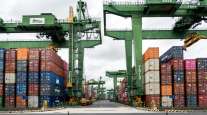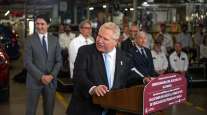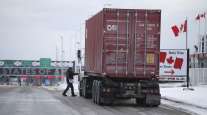Staff Reporter
North American Leaders Discuss Future of USMCA

WASHINGTON — Trade officials representing the United States, Canada and Mexico committed to advancing the treaty that is meant to serve as a replacement for the North American Free Trade Agreement. The U.S.-Mexico-Canada Agreement was announced in late September as an update to NAFTA, which took effect in 1994.
MORE FROM NGA: Could trucking be testing ground for vehicles miles traveled program?
President Donald Trump, Canadian Prime Minister Justin Trudeau and outgoing Mexican President Enrique Pena Nieto signed an authorization for USMCA on Nov. 30 at the Group of 20 summit in Buenos Aires, Argentina. The deal still needs to be ratified by Congress.
MORE FROM NGA: Training programs vital as AI develops
Montana Gov. Steve Bullock facilitated a discussion on the agreement and trade with U.S., Canadian and Mexican leaders at the National Governors Association’s winter meeting Feb. 24. Larry Kudlow, director of the National Economic Council, stressed the Trump administration’s vision of a trade deal that is free, fair and reciprocal.
Kudlow, who previously served as associate director for economics and planning in the Office of Management and Budget during the Reagan administration, projected USMCA will generate up to 100,000 new jobs. He said the deal will bring $62 billion in auto investment to the United States.

Kudlow by Eleanor Lamb/Transport Topics
“The key part really is breaking down barriers,” Kudlow said. “Give our farmers, ranchers, auto workers [and] manufacturers protection. Give us an opportunity to show you how good we are.”
Canada’s Minister of Transport, Marc Garneau, said while the deal has support, ratifying USMCA faces a serious impediment because of the deal’s tariffs on steel and aluminum. He said the tariffs weigh on Canadian and U.S. workers alike. Garneau, a former astronaut who has lived in the United States, said the United States and Canada have the largest trade partnership between two countries in the world. Canada is the top destination for products made in 35 states.
“If the tariffs on steel and aluminum are removed, Canada will move expeditiously towards the ratification of the USMCA,” he said. “We believe very, very strongly in it.

Garneau by Eleanor Lamb/Transport Topics
Kudlow responded that he and his colleagues are “hard at work” to solve the issues surrounding those tariffs. Jesus Seade, deputy minister of foreign affairs for Mexico, said NAFTA did wonders, but still presented difficulties. He lauded USMCA’s measures to protect labor and digital trade.

Seade by Eleanor Lamb/Transport Topics
Seade also called on governors to help guide lawmakers in their decisions, saying they have firsthand experiences with many of the issues that face their states’ economies.
“There is no more vibrant democracy than your country. It is not only expected but good that there should be a deep and difficult debate over something as important as the USMCA,” Seade said. “You are close to the ground [and] close to the economy. You have a direct line to the real thinking through your connection to the economies in your states.”




